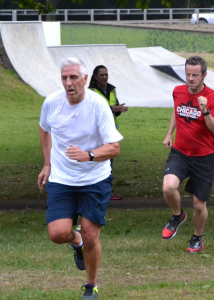Should you look to drive performance in yourself and others by competing or striving for excellence? They are different, so be clear on what you are looking to do and beware of the consequences.

Let me provide a simple non work related instance of the difference here. I am a great advocate of parkrun http://www.parkrun.org.uk/, a simple initiative to help people of all standards exercise in a community based and cost free way. Every Saturday they offer a free 5km timed run in a host of sites throughout the UK and increasingly in other parts of the world. Whilst it is well run, marshalled and timed, it described as a run not a race.
Many people try to beat their own personal best and that is their comparator. Can I run faster this week than last and can I exceed my best ever time? In this I am trying to excel. I am trying to be my best and get the most from myself. I’ll be doing it alongside many others but my focus is on how I am doing against my own standard.
A while back another participant, who I didn’t already know, told me their goal was to beat me. Their goal was to compete and they thought if they could beat me they would achieve their best. What impact did that have? For me it switched the focus — I now did not want to lose. When it’s a competition nobody wants to lose. Somebody had openly thrown down the gauntlet — I’m going to beat you. Yeah right!
My focus changed. As I ran, my mind had previously been concentrated on how fast I was going against my own personal best and my target time. Ho w can I push myself to a quicker time? Other runners around me were superfluous. Now there was an added element. This person is now on my shoulder and literally breathing down my neck, or deliberately running just in front of me. There is now a new dynamic — not losing. And that changes the run. It can then easily become a race. Neither of us is anywhere near ‘winning’ the run — we are a huge distance from that. Coming 130th had never felt like losing before, but now if the person whose espoused goal is to beat me does so, even if I come 122nd — that will feel like losing! Who wants to feel like that?
w can I push myself to a quicker time? Other runners around me were superfluous. Now there was an added element. This person is now on my shoulder and literally breathing down my neck, or deliberately running just in front of me. There is now a new dynamic — not losing. And that changes the run. It can then easily become a race. Neither of us is anywhere near ‘winning’ the run — we are a huge distance from that. Coming 130th had never felt like losing before, but now if the person whose espoused goal is to beat me does so, even if I come 122nd — that will feel like losing! Who wants to feel like that?
With 1.5 km to go there is now a choice. Do I go flat-out and have a small spurt at the end which will give me the fastest time I can do. However, if I do that I risk running out of steam before the end and being overtaken. The other option is that I sit in and pull away at the end to make sure I don’t lose, but I won’t beat my overall time. Competing has changed my focus. It’s now finishing ahead of somebody, not being the best I can be.
In my organisational work, I see managers unable to see the dangers of this. One international client had three outstanding regional managers who were wasting so much energy on not losing in the battle between them, there was no synergy, teams were pulling apart etc. I spoke to their boss and shared some of the insights and some ideas for pulling them together and how this could give a boost in overall performance. His response surprised me. This otherwise very bright guy told me ‘I prefer to set the three hounds off and see which one wins’. I was staggered, clearly there would be no ‘win’ for anybody. What would happen was quite obvious — to me anyway! And it did.
Sure, enough a year later the sharpest and clearly most capable ‘hound’ had received a significant promotion externally and left after being frustrated at trying to pull the area together. Another mentally withdrew, stopped running and left with the area now in disarray with only the ultra-competitive person left — the one for whom personal glory was most important and who is trusted least by many others across the business because of this. This represents a significant set back for the business and the people in the teams.
 In a world increasingly demanding skills in working across divisions or areas and needing more collaboration, aiding all people to excel seems to provide a much better thrust then setting up competition. People will go to extreme measures to avoid losing and that often becomes more important than winning. Had the runner asked if they could run alongside me to help them break their personal best, I’d have been happy to oblige. Had the senior manager provided just a little of a shared purpose and aligned direction he’d probably have a fantastic high performing team. Demand the best of yourself and encourage others to do the same, however if there are strong merits in people working as one to service customers, in creating innovation or similar, provide a shared purpose and prod and nudge everybody to excel, it is likely to lead to better results in both performance and team morale than competition will.
In a world increasingly demanding skills in working across divisions or areas and needing more collaboration, aiding all people to excel seems to provide a much better thrust then setting up competition. People will go to extreme measures to avoid losing and that often becomes more important than winning. Had the runner asked if they could run alongside me to help them break their personal best, I’d have been happy to oblige. Had the senior manager provided just a little of a shared purpose and aligned direction he’d probably have a fantastic high performing team. Demand the best of yourself and encourage others to do the same, however if there are strong merits in people working as one to service customers, in creating innovation or similar, provide a shared purpose and prod and nudge everybody to excel, it is likely to lead to better results in both performance and team morale than competition will.
